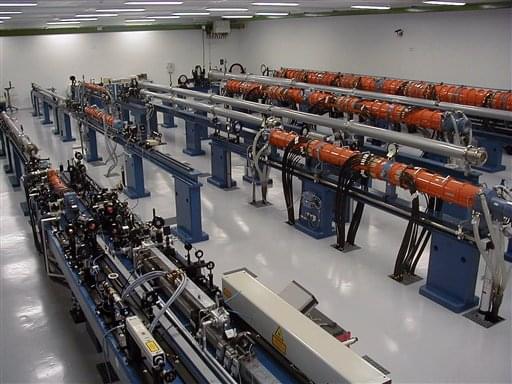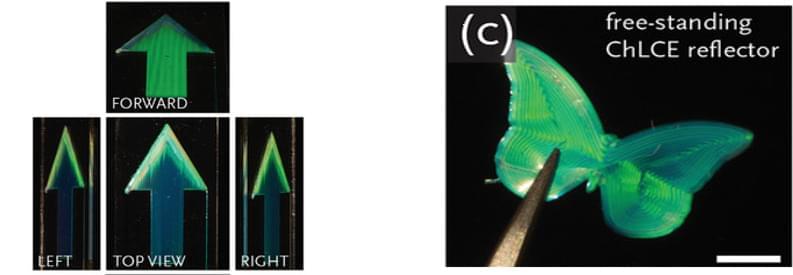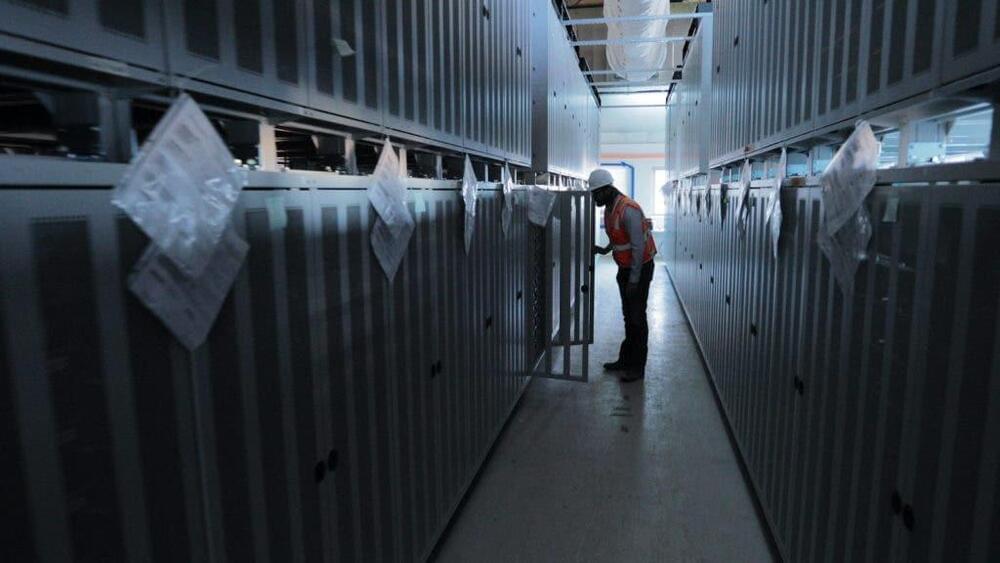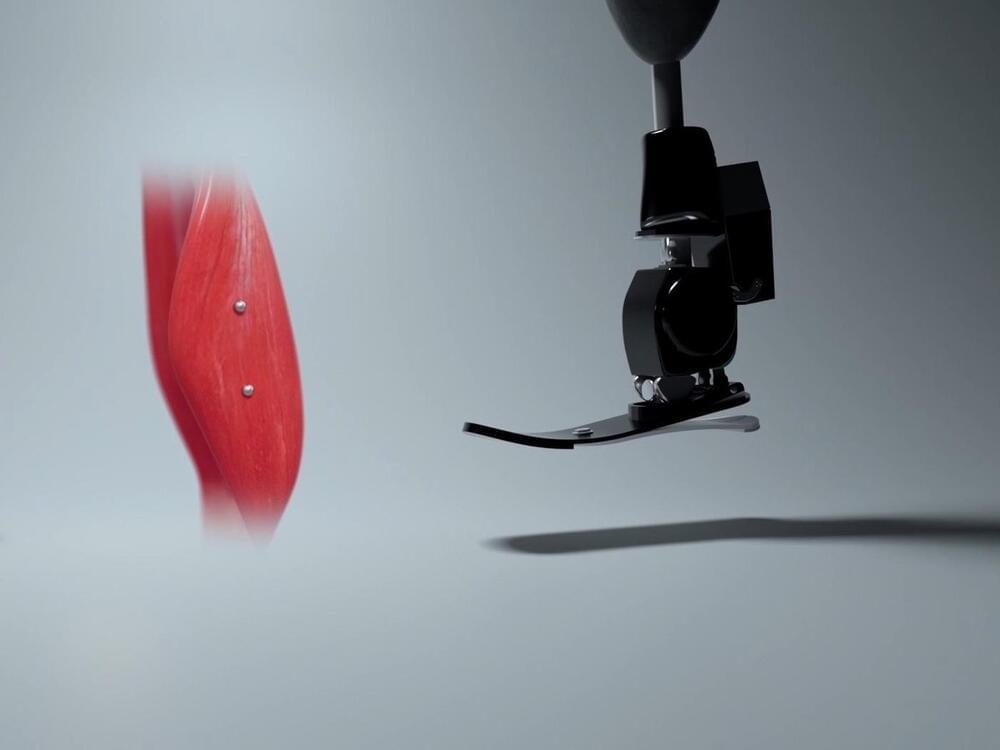If we ever want to take pictures of an Earth-like exoplanet, we need to think bigger than the biggest telescopes on Earth.




Circa 2014
Scientists in a lab used a powerful laser to re-create what might have been the original spark of life on Earth.
The researchers zapped clay and a chemical soup with the laser to simulate the energy of a speeding asteroid smashing into the planet. They ended up creating what can be considered crucial pieces of the building blocks of life.
The findings do not prove that this is how life started on Earth about 4 billion years ago, and some scientists were unimpressed with the results. But the experiment does bolster the long-held theory.


If you think at all about liquid crystals, you probably think of display technology. However, researchers have worked out a way to use an ink-jet-like process to 3D print iridescent colors using a liquid crystal elastomer. The process can mimic iridescent coloring found in nature and may have applications in things as diverse as antitheft tags, art objects, or materials with very special optical properties.
For example, one item created by the team is an arrow that only appears totally green when viewed from a certain angle. The optical properties depend on the thickness of the material which, being crystalline, self-organizes. Controlling the speed of deposition changes the thickness of the material which allows the printer to tune its optical properties.
The ink doesn’t sound too exotic to create, although the chemicals in it are an alphabet soup of unpronounceable organic compounds. At least they appeared available if you know where to shop for exotic chemicals.

What was that again about wind and solar power being unreliable? Some energy pundits are still tossing that old ball around, but meanwhile savvy investors are plowing billions into new energy storage facilities that spit out clean kilowatts on demand. Like they say, money talks, and in a fitting twist the latest example comes from the Golden State, California.
Massive New Energy Storage Facility For The Golden State
California has plenty of both wind and solar, and it also has an ambitious renewable energy goal, which makes it the perfect spot to launch ambitious clean power projects such as massive new energy storage facilities.
SUNDAY 08/22/2021 Welcome to the LabPadre 24/7 Livestream! || Onsite weather provided by INITWeather.com || BOCA CHICA NEWS: NEW Heat tile replacement continues. B3 scrapping on hold. Catch arm fabrication proceeding. New Raptors arrive at shipyard GSE tank lifted into orbital tank farm. || ROAD CLOSURES: Intermittent Aug 23rd 9:30–11:30a CDT (1430−1630 UTC) and Aug 24th 5p-11p CDT (2200−0400 UTC), also Aug 25th, 26th. || LAUNCHES: Starsem, Soyuz 2.1b/Fregat, OneWeb #9 satellite constellation launched and deployed succesfully. Next: Blue Origin/New Shepard-NS 17 Wed Aug 25 2021 at 9:35a EDT, (13:35 UTC) from Launch Site One, West Texas, Texas, USA
Thank you for watching LabPadre’s live stream from Boca Chica and South Padre Island in Texas. Subscribe for more SpaceX live coverage.
Special thanks to Greg Scott and Gator’s Dockside in Port Canaveral, Florida.
https://twitter.com/GregScott_photo.
https://www.scottphotomedia.com.
Live Nerdle Cam Link: https://youtu.be/sTA0GTgFn5E
Live Lab Cam Link: https://youtu.be/edBUxf4Lv7Y
Live Sapphire Cam Link: https://youtu.be/FLTncjUbQtI
Live Predator Cam Link: https://youtu.be/Nqt-Bxakoko.
Live Sentinel Cam Link: https://youtu.be/_og17JYSMcQ
Live Starbase Rover Cam Link: https://youtu.be/w_pjKEIozdk.
Live Port Canaveral Cam Link: https://youtu.be/BELcufzEOZ0
Live Raptor Roost Cam Link: https://youtu.be/62_WX_YWooA
Live Plex Stream Link: https://youtu.be/sMC5KonXCfg.
Live SPI Pearl Beach Cam https://youtu.be/S09IablLc7Q
Onsite Weather — http://weather.labpadre.com.
Boca Chica Operations — http://www.cameroncounty.us/space-x/
FAA Notices To Airmen — https://tfr.faa.gov/tfr2/list.html.
This 24/7 stream is powered by LabPadre, in cooperation with Sapphire Condominiums and Isla Grand Beach Resort.
Video Graphics Overlay By: https://twitter.com/AeroJamesC
All copyrights to live images are owned explicitly by LabPadre.
Intelligent chat community!
Chat Rules:
No self promotion, No Bickering, No Vulgarity, No Politics, No Religion Talk, No Trash Talking, No Flat Earth Talk, NO Anti NASA/SpaceX Talk.
To help improve the LabPadre YouTube Channel you may donate to PayPal Family & Friends: paypal.me/labpadre.
Venmo: @LabPadre.
CashApp: $LabPadre.
GIS Map link: https://www.google.com/maps/d/viewer?mid=1wvgFIPuOmI8da9EIB8…55696&z=16

As part of a wave of solar water purifier research, scientists say they can turn even brackish groundwater into drinkable fresh water in about 30 minutes. The filtration uses a metal-organic framework, or MOF, which is a highly porous polymer made by combining metal particles with “coordinating” organic pieces called ligands. It can (and must!) be used in the sun, making it ideal for many applications in situ near sources of brackish water.
Dive deeper. ➡ Read best-in-class science, tech, and energy features and get unlimited access to Pop Mech, starting now.

The attachment of the small protein ubiquitin to other proteins (ubiquitination) regulates numerous biological processes, including signal transduction and metabolism / Scientists at the University of Cologne discover the link to aging and longevity.
Scientists have discovered that the protein ubiquitin plays an important role in the regulation of the aging process. Ubiquitin was previously known to control numerous processes, such as signal transduction and metabolism. Prof. Dr. David Vilchez and his colleagues at the CECAD Cluster of Excellence for Aging Research at the University of Cologne performed a comprehensive quantitative analysis of ubiquitin signatures during aging in the model organism Caenorhabditis elegans, a nematode worm which is broadly used for aging research.
This method — called ubiquitin proteomics — measures all changes in ubiquitination of proteins in the cell. The resulting data provide site-specific information and define quantitative changes in ubiquitin changes across all proteins in a cell during aging. A comparison with the total protein content of a cell (proteome) showed which changes have functional consequences in protein turnover and actual protein content during aging. The scientists thus discovered new regulators of lifespan and provide a comprehensive data set that helps to understand aging and longevity. The article, ‘Rewiring of the ubiquitinated proteome determines aging in C. elegans,‘has now been published in Nature.

Why do so many people get frustrated with their “high-tech” prostheses? Though sophisticated robotics allow for prosthetic joints that can do everything a human can and more, the way we control robotic machines right now doesn’t allow us to operate them as naturally as you would a biological hand. Most robotic prostheses are controlled via metal pads on the skin that indirectly measure muscle action and then make some assumptions to determine what the person wants to do. Whil… See More.
We plan to use MM to provide natural control over prosthetic limbs by leveraging the human body’s proprioception. When you wiggle one of your fingers, your brain senses muscle lengths, speeds, and forces, and it uses these to figure out the position of that finger. This is called body awareness, or proprioception. When someone receives an amputation, if their muscle connections are maintained with what is called the “AMI technique,” their brain still perceives muscle flexion as it relates to joint movement, as if their limb was still present. In other words, they are sensing movement of a phantom limb. To give an amputee intuitive control over a robotic prosthesis, we plan to directly measure the muscle lengths and speeds involved in this phantom limb experience and have the robot copy what the brain expects, so that the brain experiences awareness of the robot’s current state. We see this technique as an important next step in the embodiment of the prosthetic limb (the feeling that it is truly part of one’s body).
Notably, the tracking of magnetic beads is minimally invasive, not requiring wires to run through the skin boundary or electronics to be implanted inside the body, and these magnetic beads can be made safe to implant by coating them in a biocompatible material. In addition, for muscles that are close to the skin, MM can be performed with very high accuracy. We found that by increasing the number of compass sensors we used, we could track live muscle lengths close to the surface of the skin with better than millimeter accuracy, and we found that our measurements were consistent to within the width of a human hair (about 37 thousandths of a millimeter).
The concept of tracking magnets through human tissue is not a new concept. This is the first time, however, that magnets have been tracked at sufficiently high speed for intuitive, reflexive control of a prosthesis. To reach this sufficiently high tracking speed, we had to improve upon traditional magnet tracking algorithms; these improvements are outlined in our previous work on tracking multiple magnets with low time delay, which also describes how we can account for the earth’s magnetic field during portable muscle-length tracking. This is also the first time that a pair of magnets has been used as a distance sensor. MM extends the capabilities we currently have with wired-ultrasound-crystal distance sensing (sonomicrometry, SM) and tantalum-bead-based distance sensing via multiple-perspective X-ray video (fluoromicrometry, FM), enabling us to now wirelessly sense distances in the body while a person moves about in a natural environment.